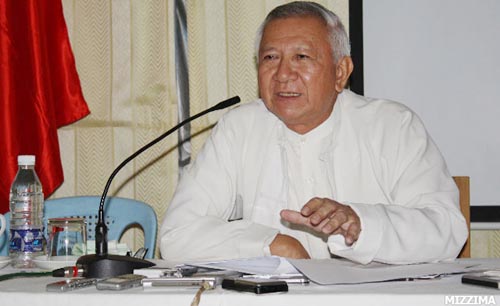Chiang Mai (Mizzima) – Burma is not a unique case. Corruption infects countries across the world. However, for Burma to move forward it is critical that the new government take measures to mitigate the negative and debilitative effects of corruption. Such was the principle message conveyed to a cross-section of leaders at the National Workshop on Reforms for Economic Development of Myanmar last week in Naypyitaw.

Myint, the chief of the Centre for Economic and Social Development at the Myanmar Development Resource Institute (MDRI), detailed his findings on corruption and necessary prescriptions to curb the scourge in his paper, “Corruption: Causes, Consequences and Cures.”
A primary axis of the new government is its focus on development and poverty alleviation, and the incorporation of measures to combat corruption would seem to be a requisite component of any successful development programme and hoped for corresponding positive reaction of the public to government initiatives.
Yet, a narrow focus on economics is insufficient, according to the study. Myint writes, “Emphasis must thus be placed on preventing corruption by tackling the root causes that give rise to it through undertaking of economic, political and institutional reforms.”
The Catch-22 is that corruption itself is an institution within Burma. “Unfortunately, corruption places severe constraints on a country's capacity to undertake economic reforms,” Myint writes. “This is because reforms require greater transparency, accountability, free and fair competition, deregulation, and reliance on market forces…all of which will reduce opportunities for economic rent on which corruption thrives. The rich and the powerful, the main gainers of a corrupt system, will therefore oppose reforms.”
Moreover, the endemic is not contained merely within the upper echelons of Burmese business and politics. As one example, authorities in Rangoon recently set out to close a number of illegal brothels. The problem was that authorities––specifically components of the security sector in this case––charged with operations are themselves reliant upon kickbacks from the perpetuation of such enterprises to subsidize meager salaries.
“Hence, rather than considering the matter only from the corruption point of view, a more wide-ranging civil service reform programme, including adjusting salaries to cover the living expenses of an average family when inflationary expectations have been brought under control, would need to be given careful and serious attention,” the study advises.
And while there have been some rudimentary signs of the government responding to economic aspects to the equation, the political component remains very much in doubt. Many opposition parliamentarians, civil society leaders and political commentators site 2015, the next scheduled general election, as the earliest possible date for substantive change in the country’s political mechanisms.
Curtailing corruption in Burma is a huge problem that will not disappear anytime soon. The country ranked second to last, just above war-and-drought-stricken Somalia, in Transparency International’s Corruption Perceptions Index 2010. Nevertheless, Myint does point to positive examples, such as that of Singapore, in which a country was able to move from a high level of corruption to a relatively clean level in a short period of time.


